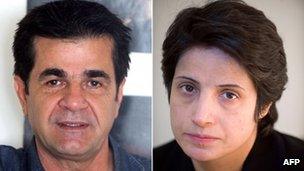Iran dissidents Sotoudeh and Panahi win Sakharov prize
- Published

Director Jafar Panahi (L) is under house arrest and lawyer Nasrin Sotoudeh is in prison
The European Union's annual Sakharov prize has gone to two Iranians noted for their opposition to the government.
Lawyer Nasrin Sotoudeh, who represents opposition activists and is now in prison, and banned filmmaker Jafar Panahi were the joint winners.
The other nominees were the jailed Russian punk band Pussy Riot and a Belarussian civil rights activist.
The Sakharov Prize is awarded by the EU for dedication to the defence of human rights and freedom of thought.
It was established in December 1988 and is named after Soviet scientist and dissident Andrei Sakharov. Winners get a 50,000 euro ($65,000) prize.
Hidden in cake
This year's joint winner lawyer Nasrin Sotoudeh defended opposition activists following the disputed June 2009 presidential elections, as well as women and young people.
She is now serving a six-year jail term at the notorious Evin prison for "acting against the national security" and "propaganda against the regime".
The 45-year-old is currently is solitarily confinement and recently went on hunger strike to protest against the authorities' harassment of her husband and two children.
Director Jafar Panahi, 52, is well known for his humanist films on life in Iran, but in 2010 he was put under house arrest and banned from filmmaking for 20 years.
His 2011 documentary This is Not a Film was smuggled out of the country on a USB stick hidden in a cake.
The President of the European Parliament Martin Schulz has said the decision to award the prize to the two Iranians was a unanimous one.
Three members of the Russian band Pussy Riot were also up for this year's award, along with Belarus activist Ales Beliatsky who heads the Vyasna human rights organisation and was sentenced to jail last November.
Punk musicians Nadezhda Tolokonnikova, Yekaterina Samutsevich and Maria Alyokhina were sentenced in to two years in a prison camp in August for staging a protest against Russian President Vladimir Putin in an Orthodox Church.
Last year the prize honoured people who the committee believed were instrumental in the Arab Spring.
Syria's Razan Zeitouneh and Libya's Ahmed al-Senussi - who later went on to form a militia and threaten that the city of Benghazi would secede before the recent Libyan elections - were among the five recipients of the 2011 prize.
- Published27 October 2011
- Published25 July 2012